The Sophomore Slump is something we're all familiar with. That a young player might struggle in their second year in a pro sports league is a notion that intuitively makes sense – teams and players have had time to adjust to a new (likely superlative) talent and now the talent has to respond. It is a real thing in the NFL but I haven't found extensive studies on this for the NHL, just anecdotal, small-sample results. Whether real or not, some players will improve their production in Year 2, and some won't.
But I don't really want to talk about Year 2 players right now. The 2021-22 rookie crop was discussed extensively all through the season and it feels redundant. What about Year 3 players? Is there a junior slump? I can't imagine there is, but someone should look into that.
Anyway, let's go through some guys whose rookie season was the 2021 COVID campaign. That was a weird bubble year and their follow-up campaign was a stopping-and-starting 2021-22 season. It's been a unique way to start an NHL career and it might be worth looking at progression and how they might fare next year. As always, data from Frozen Tools or Natural Stat Trick with cap information from Cap Friendly.
It has been two good seasons, production-wise, for Norris to start his NHL journey. Posting 52 goals and 90 points in his last 122 games, Ottawa's top centre has paced for 35 goals and 61 points per 82 games since the start of the Bubble Season. We should mention that he's shot 19.4% over those 122 games, which should be unsustainable. But the question is whether he's a 15% shooter or an 11% shooter. The former could still lead to monster scoring seasons, the latter not so much.
One significant note here is his power play scoring. Over 42% of his career goals have come with the man advantage, and that's a very high bar. For reference, Alex Ovechkin was just over 44% from 2013-2016, which was the highest share in any three-year stretch for his career. For a more recent example, Leon Draisaitl has gotten 42.6% of his goals on the power play since 2019. Either Norris is emerging as one of the elite power-play guys in the league or he needs to figure out other ways to score goals.
Whenever a player has an abnormally high shooting percentage, I always start with shot locations. From Hockey Viz, this is where Norris has been shooting from at even strength his last two seasons:
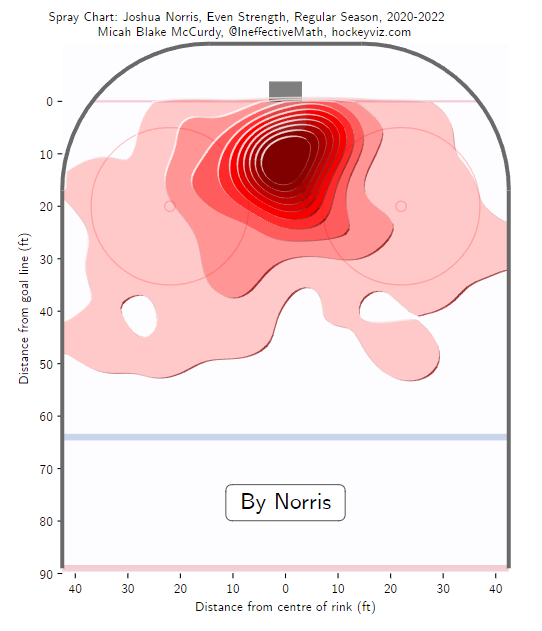
He's not getting right in tight to the net, but he is getting a lot of his shots away from the mid-slot area and that's a prime scoring spot for any goal scorer.
The issue is he's not shooting much. His 5.78 shots per 60 minutes at 5-on-5 in this sample is tied for 264th out of 333 forwards with at least 1000 minutes. In fairness, his shots per game jumped by nearly one full shot in 2021-22 (1.71 to 2.61) and another rise anywhere close to that in 2022-23 will have him as a huge volume shooter. That would soften any shooting percentage decline, which is one reason guys like Max Pacioretty and Alex DeBrincat are reliable goal scorers: being at or over 3.0 shots per game allows for a percentage decline.
The power play scoring could also become a problem with DeBrincat around. He's another great goal scorer and Norris averaged over one shot per game on the man advantage. If the team doesn't create more shots, I do wonder if we see his goal rate stagnate or even decline.
Norris is very good at finding space for shots and his chemistry with the top line seems evident. He is not a good playmaker (yet) and that's the problem here. If there's some goal stagnation, it's hard to see him making up for it in assists. If he can be the next Mika Zibanejad, that's a great thing, but there are holes in his fantasy profile that make me nervous.
Sharangovich had a very good rookie season with 16 goals and 30 points in 54 games. Quietly, he had a good sophomore follow-up with 24 goals and 46 points in 76 games. His 40 goals in 130 games to start his career works out to 25 goals every 82 games, pretty good work for a fifth rounder from 2018.
One issue for him is the wing slots are starting to fill up. The team signed Ondrej Palat to a long-term deal, Jesper Bratt is assumed to return once they figure out his deal, Dawson Mercer looks like he may start the season on the wing, and Alexander Holtz is expected to crack the roster. Add in Andreas Johnsson and Tomas Tatar and, well, the top-9 is starting to fill up.
Though he's often thought of as a shooter, Sharangovich is also good in transition. From Corey Sznajder's play tracking, the 24-year-old was well above average last year in controlled zone entry and also above average in entries leading to scoring chances:
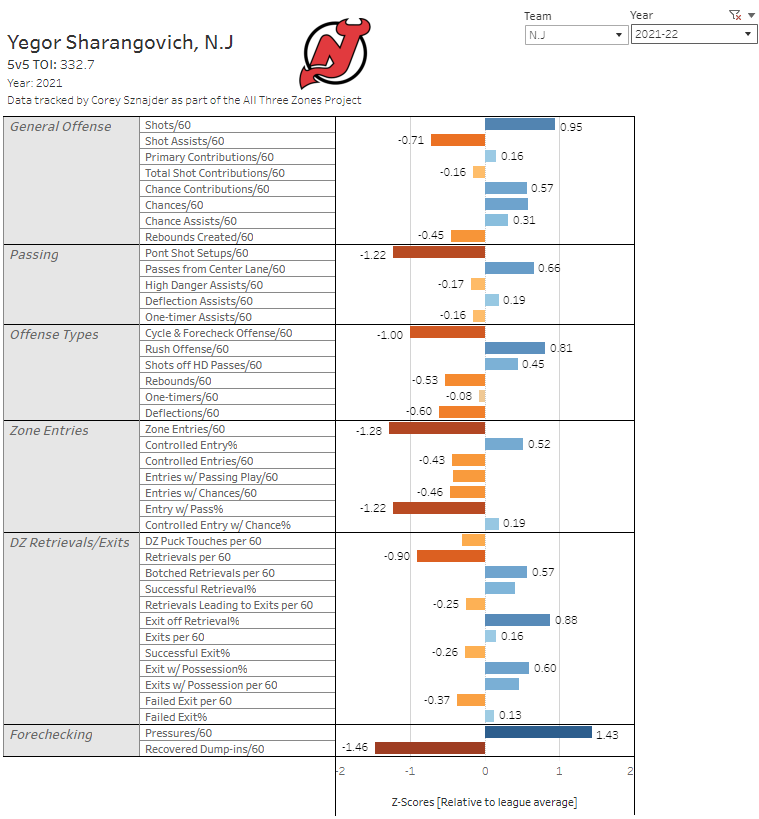
He was above average in his rookie year as well, so this seems a pattern of his play and not an aberration.
New Jersey is a smart team and they know which players excel in which areas. Both Bratt and Palat are excellent in transition, as are centres Jack Hughes and Nico Hischier. It makes me wonder if they want to stick Sharangovich in the top-6 with players that can play off what he does, or if they want him in a third-line role to help generate some offence from the depth. That could make the difference between a fantasy value in the late rounds and waiver fodder.
There is unlikely to be a top PP role for him and he may start the year on the third (or even fourth) line. He seems to be turning into a good NHLer with 30-goal potential but may not get a role that will allow him to reach that upside. He may be a better real-life player than fantasy option unless he gets a top-6 role and that could be a stretch early in the year. Pay attention as the season wears on, though, because line movement would drastically change his fortunes. If Mercer goes to the third line and Sharangovich into the top-6, we could be cooking with gas.
One of the more interesting offseason names has been Eeli Tolvanen. If Nashville wants to take a step from potential playoff team to potential contender, guys like Tolvanen and Philip Tomasino need to take a leap. Tolvanen had a good rookie season with 11 goals and 22 points in 40 games but followed that up with 11 goals and 23 points in 75 games. Not a great sophomore campaign.
In a weird coincidence, the Finnish winger had a similar profile to that of Sharangovich in 2021-22: good in transition, a healthy per-minute shot rate around a standard deviation above the league average, but some weak playmaking stats. He hasn't rounded his offensive game yet and still needs a good centre (or winger) to get him the puck in his shooting zone.
Also like Sharangovich, his fantasy value in 2022-23 will largely depend on who he plays with. He played roughly 300 out of his 830 5-on-5 minutes alongside Ryan Johansen last year. In those minutes, the team scored 3 goals per 60 minutes, greatly outpacing the team's scoring of 2.56/60. Their expected goals rate wasn't elite together, but was above the team average of 2.34:
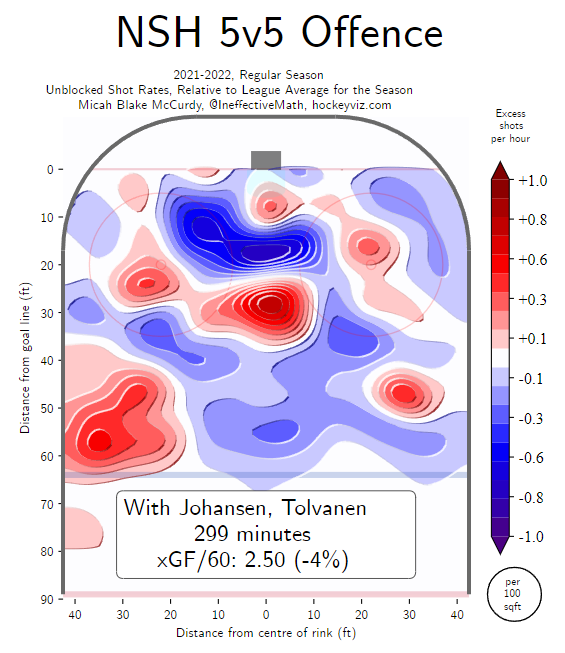
In 540 minutes together over the last two seasons, this duo has been reliably able to out-score their expected goals rate. That indicates (not definitively) that there is good chemistry here between the two of them. This is where I remind everyone that the duo of Johansen/Matt Duchene skated very little together down the stretch together, averaging about three minutes a game over the team's final 15 regular season contests.
Assuming the team keeps Trenin-Jeannot-Sissons together, they might have one spot in a top-6 winger role. They have Duchene, they re-signed Filip Forsberg, and they signed Nino Niederreiter. We could see a top-9 looking like this:
Forsberg-Granlund-Duchene
Niederreiter-Johansen-Tolvanen
Trenin-Sissons-Jeannot
That looks solid enough but doesn't leave Tolvanen with much wiggle room. If he is slow out of the gate, there are young guys like Tomasino and John Leonard looking for a chance to prove themselves.
The next issue is the power play. By far, the quartet of Duchene-Johansen-Granlund-Forsberg was their most-used power play setup. The team was also fifth in PP goals per minute in 2021-22, and if they come close to repeating that, Tolvanen isn't getting a prime PP role without an injury. That puts a cap on his upside.
Last thing to mention: the ice time for the Sissons line. By TOI, they were the second line for Nashville at 5-on-5 and if a Nino-RyJo-Tolvanen line can't outperform them, both Niederreiter and Tolvanen could be around 14 minutes a night. That is a big problem in fantasy for guys not getting prime PPTOI.
There is enough here to say that Tolvanen is rounding into a good NHLer, but that doesn't necessarily mean he'll be a good fantasy asset right now. The wrinkle are his hits, of which he has averaged over two per game these last two years. That will float his value in multi-cat leagues in case he doesn't earn more ice time. In points-only leagues, though, his line has to prove more valuable than the Sissons line and he still won't get top PPTOI without injury. For now, a 20-goal, 40-point season would be a success.
The last forward we'll talk about today is an acquisition Tampa Bay brought in to fill out the middle-6 in 2021-22. He didn't have a great performance after being traded from Chicago, posting 7 points in 22 regular season games. One big problem is he saw a huge ice time cut going from a shallow Blackhawks roster and nearly 17:30 a night to a filled-out Lightning roster and 13:35 a night. Few players can be good producers skating around 13:30 a night.
Palat signing in New Jersey is the wrinkle here. He saw nearly half of his 5-on-5 ice time come alongside Brayden Point last year. That opens a role on the team's top line with Point and (likely) Nikita Kucherov. There is competition, though, with Nick Paul, Ross Colton, Vladislav Namestnikov, and Alex Killorn all left shots that could slide up there. Add in Hagel, and there are five viable options for two left-wing slots in the top-6.
(It will be interesting to see what Tampa Bay does with their centre situation. Paul was a frequent bottom-6 centre for them after the trade, but Ross Colton could also slide in that 3C role, moving Paul to the wing. The team effectively has six centres with four spots to fill. My guess is Colton and Stamkos to the wing, but we'll find out in September.)
There are a couple reasons why I think Hagel stands a good chance of a top-line role. First is that Paul isn't very good in transition (bad, actually). He is good defensively and on the forecheck but isn't good in transition or playmaking. Those are things that elite players want and even someone like Palat was a good transition player. What we said of Paul could be said of Killorn, who used to be above-average in controlled zone entries but has seen that fall off as he's aged (he'll be 33 in September). Again, from the Sznajder tracking data, he was below league average in controlled zone entry percentage in 2021-22:
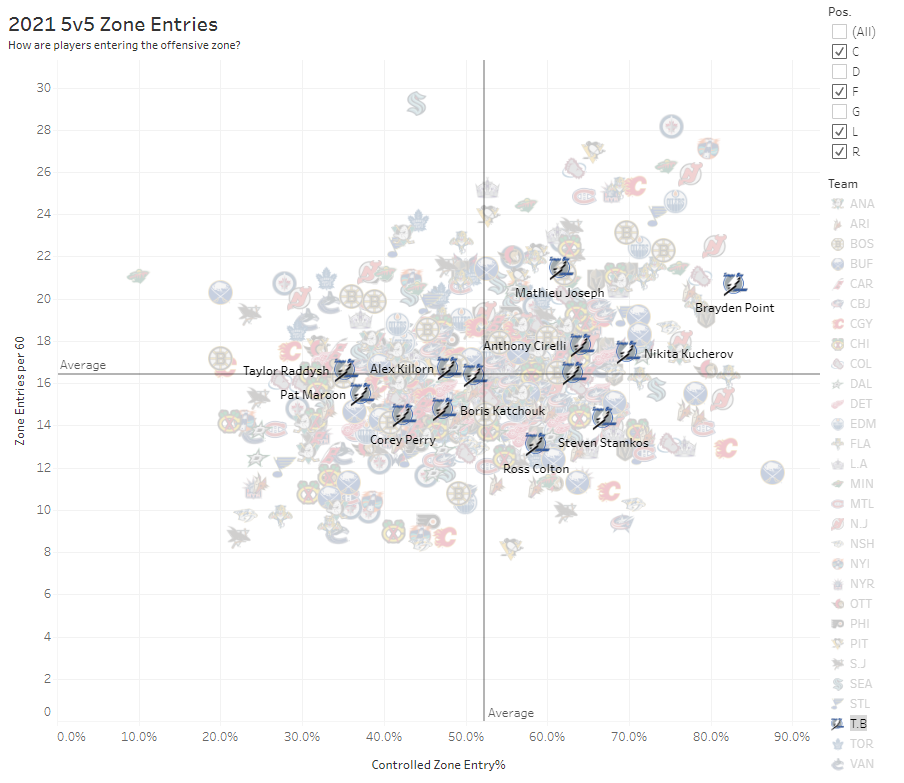
That is a mark of 48% having been at 64% as recently as 2018. His play has fallen and there's real concern he wouldn't be able to keep up with the likes of Point and Kucherov. And, if we assume Namestnikov wasn't brought in to skate on the top line, it leaves Hagel with a real shot at the top line. He is good in transition, is a decent playmaker, and is passable defensively. That's the kind of profile that Point and Kucherov could use, not an aging player that needs to be carried.
I do think Hagel stands a very good chance of sliding into Tampa Bay's top-6 this year. The question is whether it's with Cirelli or with Point. And it matters a lot: over the last three years, the duo of Point/Kucherov has scored 4.2 goals per 60 minutes at 5-on-5, with Cirelli/Stamkos at 2.5. It would have 25 goals on the table with the former group so training camp will tell us a lot. There will probably also be a lot of movement through the season because they do have a lot of similar wingers.

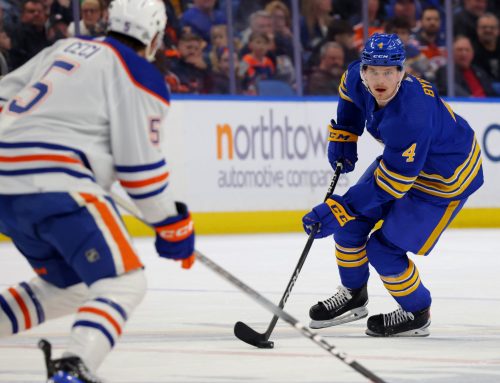
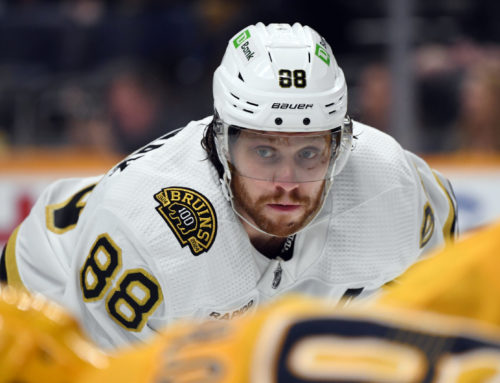

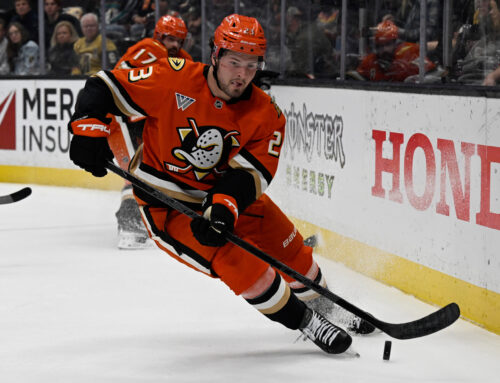
 CHI
CHI BUF
BUF NYR
NYR TOR
TOR EDM
EDM PIT
PIT N.J
N.J L.A
L.A DET
DET CAR
CAR
